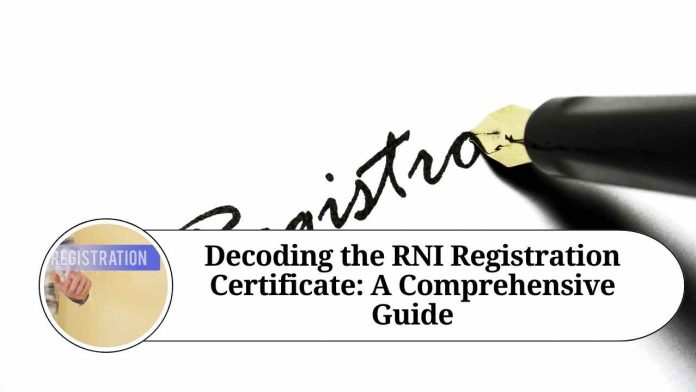Introduction:
In today’s digital age, where information flows freely across various platforms, accurate and reliable data is crucial. The Registrar of Newspapers for India (RNI) plays a pivotal role in ensuring transparency and accountability in the print media industry. One of the essential documents issued by the RNI is the Registration Certificate. In this blog post, we will delve into the details of the RNI Registration Certificate, its significance, and the process of obtaining one.
What is the RNI Registration Certificate?
The RNI Registration Certificate is an official document issued by the Registrar of Newspapers for India. It serves as proof that a particular newspaper or publication has been registered with the RNI, as mandated by the Press and Registration of Books Act, 1867. The certificate contains vital information about the publication, including its title, language, periodicity, and place of publication.
Significance of RNI Registration Certificate:
- Legal Compliance: The RNI Registration Certificate is a legal requirement for any newspaper or publication operating in India. It ensures that publishers adhere to the regulations and guidelines set by the RNI, such as maintaining accurate circulation figures, periodicity, and ownership details.
- Credibility and Authenticity: The RNI Registration Certificate lends credibility and authenticity to a newspaper or publication. It assures readers and advertisers that the publication has undergone due diligence by the RNI, enhancing trust and confidence in its content.
- Access to Government Advertising: Government advertisements play a crucial role in the revenue generation of newspapers. To be eligible for government advertising, a newspaper must possess a valid RNI Registration Certificate. Without it, publishers may miss out on lucrative opportunities.
- Protection against Imitation: The RNI Registration Certificate helps safeguard newspapers and publications from unauthorized duplication and imitation. It establishes legal proof of ownership, making it easier to take legal action against counterfeit publications.
Process of Obtaining the RNI Registration Certificate:
- Application: The first step is to submit an application to the RNI in the prescribed format. The application should include details such as the title of the publication, language, periodicity, proposed date of publication, and other relevant information.
- Verification: Once the application is submitted, the RNI conducts a thorough verification process to ascertain the authenticity of the information provided. This may involve physical inspection of the printing press, verification of circulation figures, and other necessary checks.
- Registration Fee: Upon successful verification, the applicant is required to pay the prescribed registration fee based on the periodicity and language of the publication. The fee structure is determined by the RNI and may vary accordingly.
- Issuance of Certificate: After the completion of the verification process and payment of the registration fee, the RNI issues the Registration Certificate to the applicant. The certificate contains essential details such as the title of the publication, date of registration, language, periodicity, and the name of the publisher.
Conclusion:
The RNI Registration Certificate is an indispensable document for newspapers and publications operating in India. It not only ensures compliance with legal requirements but also instills confidence in readers and advertisers. By obtaining this certificate, publishers can establish the authenticity and credibility of their publications, gaining access to government advertising and protecting their intellectual property rights. If you are a publisher or aspiring to start a newspaper, it is crucial to understand and fulfill the RNI’s requirements to obtain the Registration Certificate, thereby positioning your publication for success in the competitive media landscape.
Read more useful content:
Frequently Asked Questions (FAQs)
Q1: Who is eligible to apply for an RNI Registration Certificate?
A1: Any publisher or entity intending to publish a newspaper or periodical in India is eligible to apply for an RNI Registration Certificate.
Q2: Is it mandatory to obtain an RNI Registration Certificate for publishing a newspaper?
A2: Yes, as per the Press and Registration of Books Act, 1867, it is mandatory to obtain an RNI Registration Certificate for publishing a newspaper or periodical in India.
Q3: What information is required to be included in the application for the RNI Registration Certificate?
A3: The application should include details such as the title of the publication, language, periodicity, proposed date of publication, details of the publisher, and other relevant information.
Q4: How long does the verification process by RNI take?
A4: The verification process by RNI can take several weeks or months, depending on various factors such as the volume of applications and the completeness of the submitted documents.
Q5: What is the registration fee for obtaining the RNI Registration Certificate?
A5: The registration fee for the RNI Registration Certificate varies based on the periodicity (daily, weekly, etc.) and language of the publication. The fee structure is determined by the RNI.
Q6: Can the RNI Registration Certificate be transferred to a new owner if the publication changes hands?
A6: No, the RNI Registration Certificate is not transferable. If the ownership of the publication changes, the new owner must apply for a fresh registration certificate.
Q7: Can an online publication or e-newspaper obtain an RNI Registration Certificate?
A7: Yes, online publications and e-newspapers can also apply for and obtain an RNI Registration Certificate, provided they meet the eligibility criteria and comply with the guidelines set by the RNI.
Q8: Is there a validity period for the RNI Registration Certificate?
A8: No, the RNI Registration Certificate does not have a specific validity period. Once obtained, it remains valid unless there are any changes in the publication’s details or non-compliance with RNI regulations.
Q9: Can a publication operate without an RNI Registration Certificate?
A9: No, it is illegal to operate a newspaper or periodical without an RNI Registration Certificate. Non-compliance can lead to penalties, legal action, and closure of the publication.
Q10: Can a publication change its title or periodicity after obtaining the RNI Registration Certificate?
A10: Yes, a publication can apply for a change in title or periodicity after obtaining the RNI Registration Certificate. However, such changes need to be approved by the RNI, and the publication must follow the prescribed procedure for modification.




















